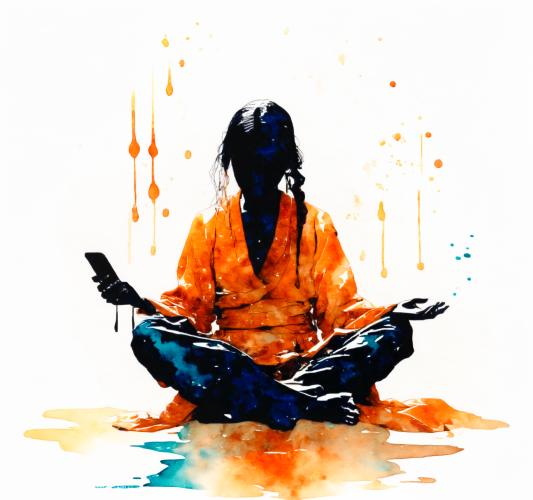In our journey to find meaning and personal growth, have we accidentally turned spirituality into content? Discover how the modern spiritual marketplace strips profound practices down to marketable aesthetics, and more importantly, how to preserve what matters in your own practice. It's time for an honest conversation about maintaining authenticity in an increasingly commercialized spiritual landscape.
Between the sponsored posts for luxury tarot decks and influencers promising enlightenment through their premium courses, spirituality has become big business. Scroll through social media and you'll find everything from crystal subscription boxes to "manifestation masterclasses," each promising to unlock your highest potential - for a price. Yet, as I explained in my Shadow Work article, real personal growth isn't about aesthetics or algorithms - it's about facing the parts of ourselves we'd rather not share on social media at all.
For those unfamiliar with the term, enshittification describes how platforms degrade over time: first, they attract users by providing genuine value, then they slowly shift priorities to maximize profit at the expense of user experience. Think of how social media platforms evolved - from spaces of authentic connection to algorithmic feeds optimized for engagement and ad revenue. The spiritual community is undergoing a similar transformation. What started as genuine seekers sharing wisdom and experience has become a marketplace where authenticity itself is just another product to be packaged and sold.
The Aesthetic of Growth vs The Reality
Social media would have us believe that spiritual growth looks like perfectly arranged altar setups and well-lit photos of journal entries filled with beautiful calligraphy. The reality is far messier. Sometimes it's sitting on your bedroom floor at 3 AM, ugly-crying over a spread that's just confirmed what you've been avoiding for months. It's wrestling with forgiveness, confronting your own prejudices, and admitting when you've been wrong.
I've watched the proliferation of "spiritual aesthetics" with growing concern. Not because beautiful tools and spaces can't support our practice - they absolutely can. But I've seen too many people get stuck in the acquisition phase, collecting decks, crystals, and altar tools while never actually sitting down to do the uncomfortable work of self-examination.
The issue isn't the tools themselves. That limited edition deck with gold foiling might be genuinely beautiful and meaningful. The problem arises when we mistake having the tools for doing the work. It's like having a fully equipped gym in your home but never working out - the equipment isn't at fault, but it's not going to make you fit by osmosis.
The Commodification of Wisdom
This continued commercialization of spiritual practice has created an environment where wisdom is treated as a commodity - something to be packaged, marketed, and sold rather than earned through experience and reflection. It follows the same pattern we've seen with social media platforms: first, attract genuine seekers and teachers, then maximize "engagement" at the expense of depth, and finally extract maximum profit while providing minimum value.
This commodification manifests in various ways. There's the pressure to turn every insight into content, every practice into a product. Spiritual experiences become social media fodder, personal revelations become marketing opportunities, and the messy, non-linear process of growth gets repackaged into neat, marketable steps. Complex wisdom traditions that took centuries to develop are reduced to "5 Simple Steps to Enlightenment" or "Quick Tarot Tips for Instant Insight."
The impact on both practitioners and seekers is profound. As a reader, I've felt the pressure to maintain a certain image, to make my practice more "marketable." I've watched fellow practitioners burn out trying to keep up with social media demands while maintaining authentic practice. And I've seen seekers become disillusioned when their spiritual journey doesn't match the polished version they see online. We have reduced something that should bring meaning and fulfillment to our lives to a superficial aesthetic. As a result, I see people jumping from guru to guru, religion to religion, hoping that the next one will bring them the wisdom, answers and meaning that they crave.
Like any platform undergoing enshittification, spiritual practices are being optimized for engagement rather than transformation. The algorithms favor quick readings over deep insights, dramatic revelations over quiet wisdom. In this environment, genuine growth becomes increasingly difficult to find amid the noise of marketable spirituality.
The Problem with Performative Spirituality
There's a particular irony in performing spirituality for social validation - it often strengthens the very ego we're supposedly working to understand and integrate. I've caught myself doing this: carefully arranging cards for a photo when I should be focusing on their message, thinking about how to share an insight before I've fully processed it myself.
The difference between genuine sharing and performative spirituality often lies in the intention. When I share aspects of my practice now, I first ask myself some hard questions:
- Am I sharing this to contribute meaningfully to others' journeys, or am I seeking validation?
- Have I fully integrated this insight myself, or am I rushing to teach something I'm still learning?
- Does sharing this serve the spiritual growth of others, or just my social media metrics?
- Am I using my platform to encourage real growth, or to build my personal brand?
The Tools Are Not the Work
I made the point in my article on Tarot Dependency that tools are just that - tools. The most profound readings I've ever done came from a well-worn Rider-Waite-Smith deck that wouldn't photograph well for Instagram. The most significant spiritual insights often arrive during quiet moments with simple tools, not during elaborately staged rituals with the latest spiritual accessories.
This isn't about rejecting beautiful decks or meaningful tools. I own and cherish several artistically stunning decks. But they're meaningful because of how I use them in my practice, not because of how they look on my shelf or in photos.
Doing the Real Work
Real spiritual work is rarely Instagram-worthy. It involves:
- Facing uncomfortable truths about ourselves
- Processing difficult emotions
- Taking responsibility for our actions and their impact
- Developing genuine empathy and understanding
- Making actual changes in our behaviour
- Practicing forgiveness (including of ourselves)
These processes don't tend to photograph well. They're messy, ongoing, and often invisible to outside observers. The most significant spiritual growth might look, from the outside, like someone simply sitting quietly with their thoughts.
Finding Balance in a Commercial World
After years of navigating this landscape, here's what I've learned about maintaining authentic practice in a commercialized spiritual environment:
- Check your intentions regularly
When I find myself reaching for a new deck or considering sharing aspects of my practice online, I pause to examine my motivations. Am I seeking tools for growth or props for performance? Am I sharing to contribute or to validate? - Prioritize private practice
Not everything needs to be shared. Some of my most meaningful spiritual experiences have never been documented or posted about. Having a solid foundation of private practice helps maintain authenticity when I do choose to share publicly. - Use social media mindfully
I've learned to be selective about both what I share and what I consume. I follow accounts that encourage genuine growth rather than just aesthetic spirituality. When I share, I aim for authenticity over perfection. - Invest in the work itself
This means spending time with uncomfortable realizations, practicing regularly (not just when inspired), and focusing on integration rather than acquisition. It means being willing to sit with difficult emotions rather than shopping them away.
Moving Forward
What we're seeing in spiritual practice mirrors what happens to many online platforms - they start by offering genuine value, build a community, then gradually degrade the experience in pursuit of profit. But unlike digital platforms, we have a choice in how we engage with our spiritual practice. The commercialization isn't inherently negative. Fair compensation for spiritual work is appropriate, and beautiful tools can genuinely support our practice. The key is remembering that they're aids to the work, not substitutes for it.
The cards themselves offer wisdom here. The Eight of Pentacles reminds us that mastery comes through dedicated practice, not shortcuts. The Seven of Cups warns against being distracted by shiny objects instead of doing the real work. And The Hermit? Well, they've never worried about how many followers they have.
Genuine spiritual growth isn't measured in purchases made or likes received. It's measured in the quiet moments of self-reflection, in changed behaviour, in healed relationships, and in the gradual but genuine transformation of how we move through the world. That's the kind of growth that resists enshittification - because it can't be packaged, productized, or sold. It can only be earned through the messy, unglamorous work of genuine personal development.






